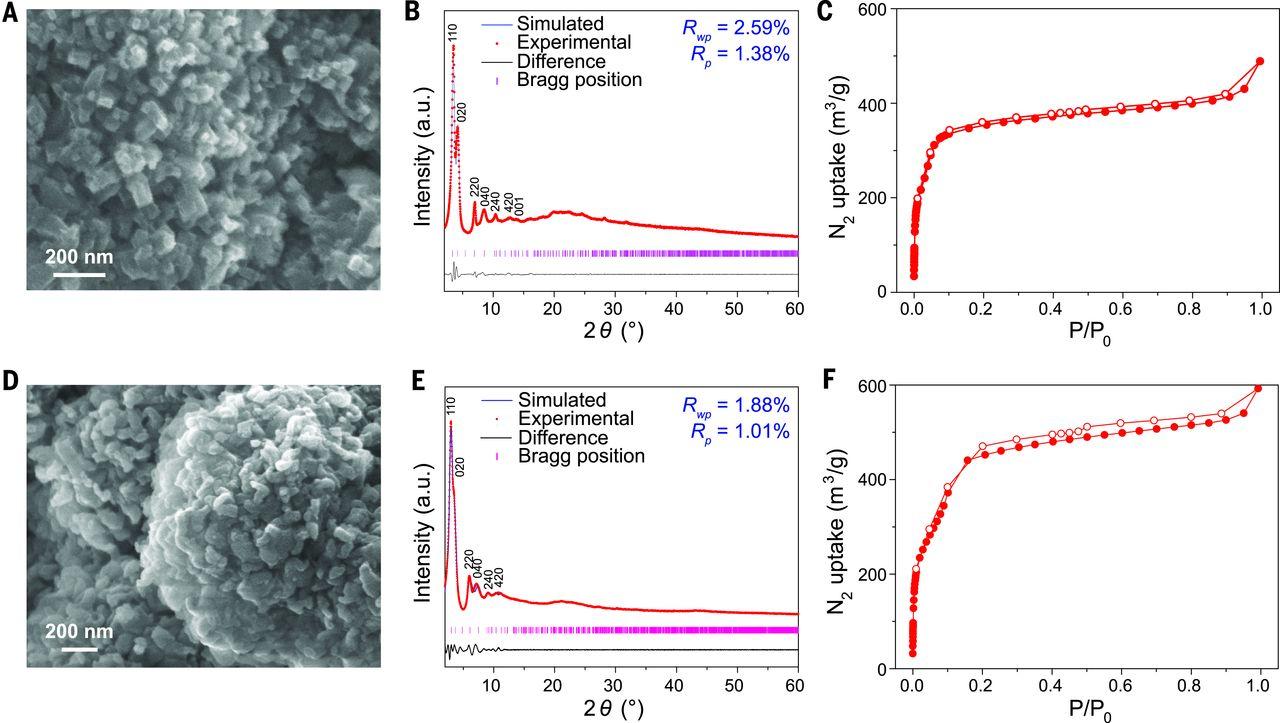Covalent organic frameworks comprising cobalt porphyrins for catalytic CO2 reduction in water
IF 45.8
1区 综合性期刊
Q1 MULTIDISCIPLINARY SCIENCES
引用次数: 1649
Abstract
Conversion of carbon dioxide (CO2) to carbon monoxide (CO) and other value-added carbon products is an important challenge for clean energy research. Here we report modular optimization of covalent organic frameworks (COFs), in which the building units are cobalt porphyrin catalysts linked by organic struts through imine bonds, to prepare a catalytic material for aqueous electrochemical reduction of CO2 to CO. The catalysts exhibit high Faradaic efficiency (90%) and turnover numbers (up to 290,000, with initial turnover frequency of 9400 hour−1) at pH 7 with an overpotential of –0.55 volts, equivalent to a 26-fold improvement in activity compared with the molecular cobalt complex, with no degradation over 24 hours. X-ray absorption data reveal the influence of the COF environment on the electronic structure of the catalytic cobalt centers.

用于催化水中二氧化碳还原的卟啉钴共价有机框架
将二氧化碳(CO2)转化为一氧化碳(CO)和其他高附加值碳产品是清洁能源研究的一项重要挑战。在此,我们报告了共价有机框架(COFs)的模块优化,其中的构建单元是卟啉钴催化剂,通过亚胺键由有机支链连接,从而制备出一种将 CO2 水电化学还原为 CO 的催化材料。这种催化剂在 pH 值为 7、过电势为-0.55 伏的条件下表现出很高的法拉第效率(90%)和周转次数(高达 29 万次,初始周转频率为 9400 小时-1),与分子钴复合物相比,活性提高了 26 倍,且在 24 小时内无降解现象。X 射线吸收数据揭示了 COF 环境对催化钴中心电子结构的影响。
本文章由计算机程序翻译,如有差异,请以英文原文为准。
求助全文
约1分钟内获得全文
求助全文
来源期刊

Science
综合性期刊-综合性期刊
CiteScore
61.10
自引率
0.90%
发文量
0
审稿时长
2.1 months
期刊介绍:
Science is a leading outlet for scientific news, commentary, and cutting-edge research. Through its print and online incarnations, Science reaches an estimated worldwide readership of more than one million. Science’s authorship is global too, and its articles consistently rank among the world's most cited research.
Science serves as a forum for discussion of important issues related to the advancement of science by publishing material on which a consensus has been reached as well as including the presentation of minority or conflicting points of view. Accordingly, all articles published in Science—including editorials, news and comment, and book reviews—are signed and reflect the individual views of the authors and not official points of view adopted by AAAS or the institutions with which the authors are affiliated.
Science seeks to publish those papers that are most influential in their fields or across fields and that will significantly advance scientific understanding. Selected papers should present novel and broadly important data, syntheses, or concepts. They should merit recognition by the wider scientific community and general public provided by publication in Science, beyond that provided by specialty journals. Science welcomes submissions from all fields of science and from any source. The editors are committed to the prompt evaluation and publication of submitted papers while upholding high standards that support reproducibility of published research. Science is published weekly; selected papers are published online ahead of print.
 求助内容:
求助内容: 应助结果提醒方式:
应助结果提醒方式:


